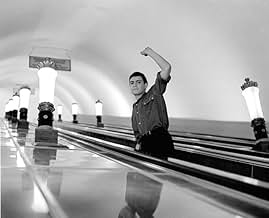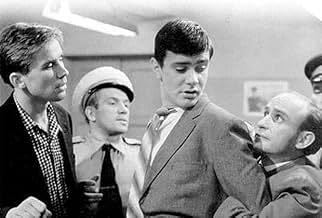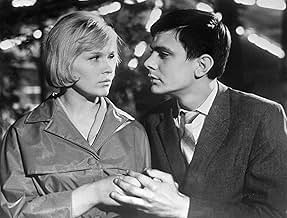Ya shagayu po Moskve
- 1964
- 1h 18min
El joven escritor siberiano Volodya conoce a Kolya en el metro de Moscú en su visita a un famoso autor. Volodya y Sasha, el amigo de Kolya, se aventuran a su manera en la aventura amorosa, m... Leer todoEl joven escritor siberiano Volodya conoce a Kolya en el metro de Moscú en su visita a un famoso autor. Volodya y Sasha, el amigo de Kolya, se aventuran a su manera en la aventura amorosa, mientras que Kolya se propone ayudarles.El joven escritor siberiano Volodya conoce a Kolya en el metro de Moscú en su visita a un famoso autor. Volodya y Sasha, el amigo de Kolya, se aventuran a su manera en la aventura amorosa, mientras que Kolya se propone ayudarles.
- Dirección
- Guionista
- Elenco
- Premios
- 1 nominación en total
- Tantsuyushchaya na aerodrome
- (as A. Aleynikova)
- Prodavshchitsa morozhenogo
- (as V. Ananina)
- Devushka pod dozhdem
- (as S. Besedina)
- Konferanse
- (as V. Vasilyeva)
- Khozyayka sobaki
- (as N. Vinogradova)
- babushka Koli
- (as Ye. Melnikova)
- Katya - sestra Kolki
- (as I. Mirosnichenko)
- Angelina Petrovna
- (as A. Pavlova)
- Dezhurnaya na stantsii metro
- (as A. Rumyantseva)
- Nadya
- (as I. Skobtseva)
- mama Nikolaya
- (as L. Sokolova)
- Anya
- (as D. Stolyarskaya)
- Svetka
- (as I. Titova)
- Dirección
- Guionista
- Todo el elenco y el equipo
- Producción, taquilla y más en IMDbPro
Opiniones destacadas
I would place it on the same level as Fellini's Roma or Woody's "Manhattan" - yes, I think it is that good and I see it as the love letter to the magnificent city on the Moskva River which used to by My city, too. It is about spring in Moscow of 1963, (in more ways than one), about youth, first love, smiles, sudden meetings and inevitable goodbyes. It takes place on the streets of Moscow, in its parks, subway stations, and movie theaters. It follows the "Moskvichi" and the guests of the city, young and middle-aged, romantic and tired, friendly and suspicious, happy and disappointed, wise and naive in the series of short vignettes and it introduces us to the characters whom we get to meet, to like, and to follow on their journey in the course of one long sunny rainy spring day.
Just as in the end of a news hour, there's a 60 second feel-good segment, in every generation, there's its own feel-good story. The scrutiny of how realistic those dreamy fantasies of the past are is beyond the point. Relaxing in the backyard's arm chair with a glass of well-deserved glass of wine reflecting on the past is of course a part of the drill.
In the end, this patriotic narcissistic drivel could have been "Ya shagayu po Berlin (1964)" or "Ya shagayu po Hiroshima (1964)" full of love, spring vitality and romanticism. Which is of course fine as the life obviously goes on.
And perhaps it's fine. It depends on the viewer's outlook. But for some, the film will be clearly interspersed with visual and conceptual references aggrandising and beautifying what the country has gone through in the preceding 50 years. A sort of the Soviet Union of Amnesia that is. A common propaganda "feel-good" trick in a wide range of other tricks in the toolboxes of various Ministries of Truth across the globe.
One thing is for sure: this is a movie done by the power which won the war, so history is written accordingly. Small but curious detail.
The film was made in the period of the cultural thaw after the deat of Stalin. In this period much was possible leading to films that are also cult in the rest of the World, like "Soy Cuba" (1964, Mikhail Kalatozov) from the same year.
Much was possible, but not everything. Just like in the West in the first half of the '60s a post Second World War generation grew up and raised his voice. Screenwriter Gennady Shpalikov wrote a script about this generation featuring friends returning to Moscow after their military service. The script was not received warmly by the censors although it ultimately became the film "I am twenty" (1965, Marlen Khustsiev).
"Walking the streets of Moscow" is the more innocent version of "I am twenty" written by the same screenwriter. Its protagonists are younger (17-18 years of age) and their rebellion more innocent. Helpful too would have been that Moscow is portrayed at his most advantageous side. Look at the metro stations, the GUM department store, Gorki park and the brandnew airport.
"Walking the streets of Londen" is about two boys and a girl doing exactly that what the title describes. Apart from the rebellion of the post war generation it is also about a love triangle. Comparing it with Western counterparts as "A hard day's night" (1964, Richard Lester, rebellion of the post war generation) and "Jules and Jim" (1962, Francois Truffaut, love triangle) we understand why the film never became a World-wide cult movie.
The movie contains an iconic scene in which a girl walking barefoot in the rain is accompanied by a boy cycling next to her and trying to hold an umbrella above her head. Comparing this iconoc scene with for example the scene from "La dolce vita" (1960, Federico Fellini) in which Anita Ekberg is wading in the Trevi fountain there is again one word that comes to mind: innocence!
Why did the film became cult in Russia? I think one explanation is that the cultural thaw disappeared in the Brezhnev years and that there is a lot og nostalgia connected to the early sixties.
The movie portraits Soviet 'ottepel'' period but is not about politics-
It is about Moscow, sincere human relations, freedom, youth, idealism, great actors' play, great song - 'A ya idu shagau po Moskve i ya proiti eshe smogu! '.
I like the spirit of the movie (freedom) which has been copied thousands of times in other Russian movies but neither succeeded.
So, honestly, find and see this movie!
My rating: 10/10.
¿Sabías que…?
- Citas
Volodya Yermakov: Arriving or departing?
Girl at the Airport: Waiting for arrivals.
Volodya Yermakov: Who is it?
Girl at the Airport: My husband.
Volodya Yermakov: He's lucky to have someone to meet him.
Girl at the Airport: Get married, you'll have someone as well.
Volodya Yermakov: And you are both happy?
Girl at the Airport: Yes, we are.
Volodya Yermakov: It never happens.
Girl at the Airport: Believe me, it happens.
- ConexionesFeatured in Tatsu (1994)
- Bandas sonorasA ya idu, shagayu po Moskve
Music by Andrey Petrov
Lyrics by Gennady Shpalikov
Performed by Nikita Mikhalkov
Selecciones populares
- How long is Walking the Streets of Moscow?Con tecnología de Alexa
Detalles
- Tiempo de ejecución1 hora 18 minutos
- Color
- Mezcla de sonido
- Relación de aspecto
- 2.35 : 1
Contribuir a esta página
































